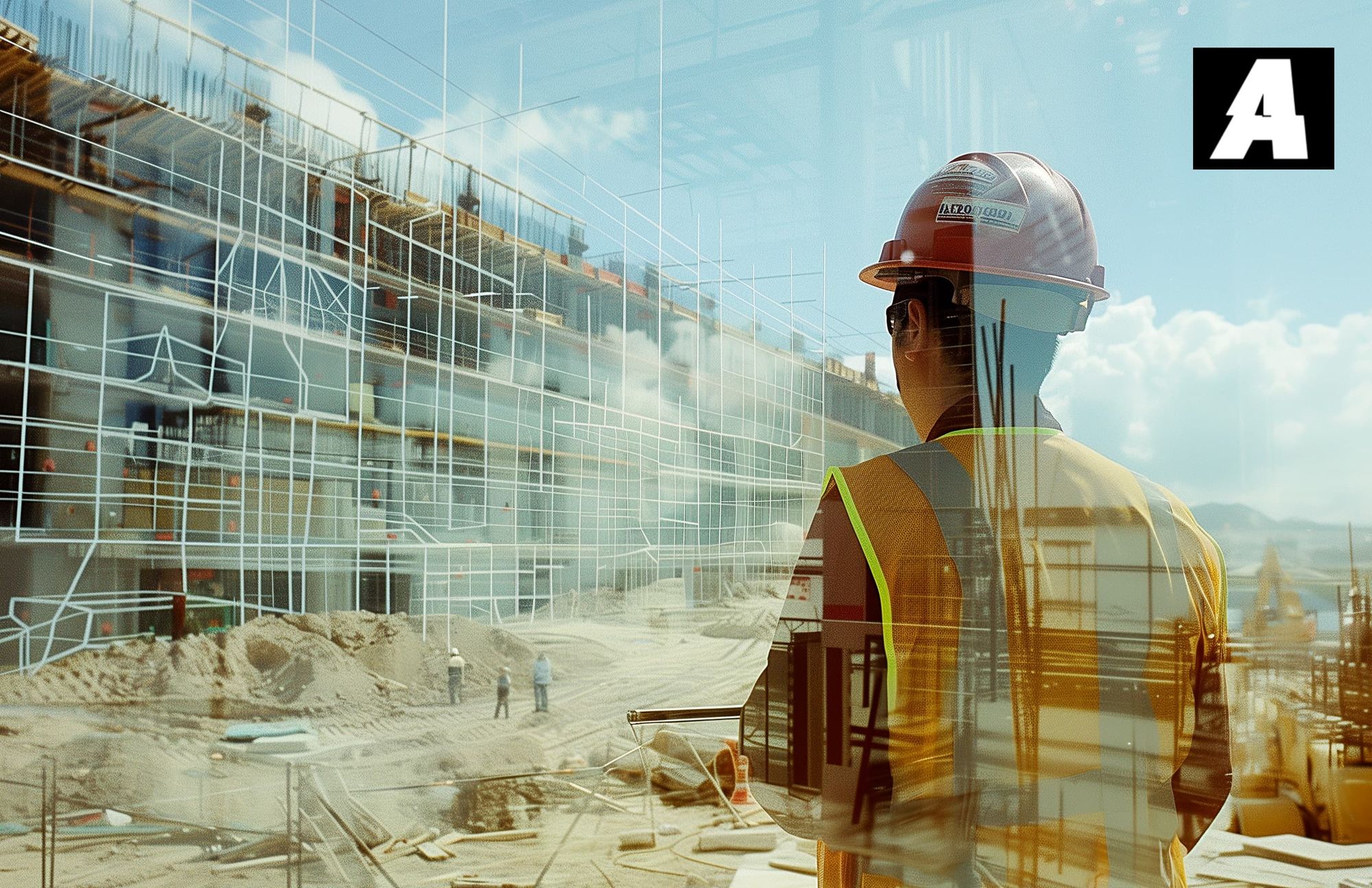AI in Construction: A Glimpse into the Future

Artificial intelligence has made its mark in the construction industry, heralding a transformative era for our sector. As we embark on this new phase of construction technology, it becomes crucial to grasp the essence of artificial intelligence and its potential to revolutionize productivity and performance in construction.
This article lays the groundwork for understanding artificial intelligence in preconstruction. We delve into how AI presents opportunities to streamline business processes, enabling better decision-making and strategic preconstruction planning.

Understanding Artificial Intelligence
In today's intricate and data-rich construction landscape, businesses that can effectively leverage data, derive meaningful insights, and make strategic decisions hold a significant advantage. Artificial intelligence (AI) is making its mark in the construction industry after years of development and conceptualization.
The presence of AI in construction is made possible by advancements in computing power, algorithmic precision, the vast amounts of industry-generated data, and innovations in system integration. The time to embrace and integrate AI into your business operations is now.
While the concept of artificial intelligence is not new, its origins date back to the 1950s. Pioneers like Arthur Samuel defined AI as "the field of study that gives computers the ability to learn without explicitly being programmed." Essentially, AI involves computers and systems that learn from experience. The goal of AI is to enable machines to perform tasks currently handled by humans, but to do them more efficiently and swiftly.

Exploring Artificial Intelligence, Machine Learning, and Deep Learning
Artificial intelligence (AI) resides at the intersection of computer science and data analytics, utilizing vast datasets to tackle complex problems. You've likely encountered AI in everyday scenarios, such as voice-activated searches through Amazon's Alexa or Apple's Siri. Search engines employ AI algorithms to curate and present relevant information based on user queries. Additionally, platforms like YouTube and Netflix leverage AI to recommend videos tailored to your preferences and viewing history.
While often mentioned alongside artificial intelligence, machine learning constitutes a distinct subset of AI. Unlike traditional programming, machine learning algorithms learn from experience, adapt, and enhance performance autonomously, without explicit programming.
Deep Learning in Artificial Intelligence
Deep learning, a prominent aspect of artificial intelligence today, focuses on emulating human cognitive processes to derive optimal insights from data. Inspired by the neural networks in the human brain, deep learning harnesses artificial neural networks to analyze extensive datasets and address complex problems with minimal human intervention. These AI networks excel in processing vast volumes of data, continuously improving through training, and adeptly resolving intricate challenges.
Artificial Intelligence in Preconstruction
Preconstruction, a critical phase in commercial construction projects, involves collaboration among diverse stakeholders to plan project execution before actual construction commences. This phase engages building owners, architects, engineers, trade contractors, general contractors, and manufacturers to coordinate various aspects of the project, ensuring smooth progress and successful outcomes.
Enhancing Commercial Construction Through Preconstruction
Preconstruction plays a pivotal role in ensuring timely project completion, adherence to budget constraints, and client satisfaction in commercial construction endeavors. By meticulously outlining the sequence of tasks and involving the appropriate stakeholders, preconstruction sets the stage for project success.
Similar to the construction projects themselves, the robustness of preconstruction efforts significantly influences project outcomes. The preconstruction phase varies based on factors like project type (e.g., hotel, school, road, or bridge), delivery methods, scope of work, and whether the project is public or private. These variables shape the preconstruction process, guiding it towards optimal outcomes tailored to specific project requirements.

AI's Impact on Preconstruction Project Phases
The subsequent preconstruction project phases delineate the preparatory steps preceding actual construction and elucidate how artificial intelligence is revolutionizing the planning process.
AI's Impact on the Pre-Design Phase:
Comprising conceptual design, initial project planning, project development, and feasibility studies, this phase is instrumental in laying the groundwork for the project. The project team initiates with conceptualizing the structure, conducts a comprehensive site analysis to identify potential challenges, and formulates strategies to mitigate them. Additionally, this phase entails crafting a preliminary project scope and budget.
During the pre-design or initial project planning and development phase, AI proves invaluable in conducting feasibility studies to ascertain project viability. By analyzing various data sets such as financial, market, and environmental impact data, risks can be identified and evaluated. The insights gleaned from risk analysis aid in making informed decisions regarding project continuation. AI's effectiveness lies in its ability to provide thoroughness, accuracy, and impartiality, making it a potent tool in this stage.
AI's Influence one the Design Development Phase:
This phase encompasses the creation of detailed design documents that guide the project's trajectory. Documents generated during this phase encompass architectural, structural, mechanical, electrical, and plumbing plans.
The design development phase stands as a pivotal stage in the project development journey. It entails refining the conceptual design into a detailed and executable blueprint, transitioning from abstract concepts to concrete plans. Within the design development phase, crucial decisions are made that influence the ultimate outcome of the project, encompassing cost considerations, energy efficiency enhancements, and overall functionality improvements. Artificial Intelligence emerges as a key player in this phase, offering novel tools and methodologies aimed at enhancing the efficiency and caliber of the design development process.
AI's Effect on Construction Documents
This phase encompasses the creation of final construction documents, comprising detailed construction blueprints, specifications for building materials, and contractual paperwork. Additionally, it involves the formulation of the construction schedule, delineating the sequence and anticipated duration of all tasks essential for project completion.
Incorporating AI-driven tools streamlines the extraction, analysis, and processing of data from construction documents. For instance, natural language processing (NLP) can be leveraged to scrutinize project requisites and generate an elaborate project scope document based on two-dimensional construction plans like PDF files. NLP, a stalwart component of AI, has been in existence for over half a century, facilitating the comprehension and interpretation of human language, both written and spoken. This approach conserves time and resources in contrast to the laborious nature of conventional methods, such as manual data entry or spreadsheet computations.
Ai Driven Bidding and Negotiation
This stage involves disseminating project plans to various trades, contractors, and manufacturers for the bidding process. The project team assesses the received bids, engages in negotiations with contractors, and ultimately selects the winning proposals. Particularly crucial for general contractors and trade contractors, this phase entails generating and providing detailed takeoffs and estimates to submit competitive bids.
Trade contractors, general contractors, and building supply manufacturers scrutinize the project scope, identify pursuit opportunities, strategize bidding approaches, and determine which projects meet the criteria for success. Leveraging the capabilities of AI, trade contractors can streamline procedures, automate repetitive tasks such as takeoffs, and enhance the speed at which crucial decisions, like evaluating the profitability of projects, are made.
Ai's Impact on Permitting and Approvals
During this stage, construction documents are submitted to relevant governmental agencies for review and approval, where necessary. Artificial intelligence plays a role in ensuring compliance with building codes and streamlining the building permit process.
Finalizing Preconstruction
This phase involves completing contracts, mobilizing contractors, and commencing construction activities. Sound preconstruction planning and strategic decision-making are vital for the profitability of trades, general contractors, and building product manufacturers.
The construction schedule is finalized, detailing the sequence and expected duration of all activities necessary for project completion.
The preconstruction stages often grow in complexity due to various factors such as project nature, the imperative for effective communication and collaboration among teams, and compliance with local and national regulations. Time and budget constraints consistently influence the success of construction projects. Technologies like AI present an opportunity to enhance performance across the preconstruction lifecycle.
#Robots are likely to replace #jobs that rely solely on physical labor and involve repetitive tasks #AI #Robotics #FutureOfWork
— Art Evolves Magazine (@ArtEvolves) February 25, 2024
Find out how #Construction will be influenced by Ai here https://t.co/BfpL5E5MTM pic.twitter.com/DBElnXNxsy
AI and Construction Collaboration Beyond Preconstruction
Apart from preconstruction, AI continues to emerge in various facets of construction, facilitating advancements in performance and safety. Examples include:
Predictive maintenance: AI analyzes data from building systems like HVAC and electrical systems to forecast maintenance needs and prevent equipment failures.
Site safety: AI-driven cameras and sensors, including those worn by workers, monitor construction sites for potential safety risks and promptly alert workers and managers to potential hazards.
Robotics: AI and machine learning efficiencies have revolutionized tasks like robotic bricklaying, welding, and 3D printing entire structures.
Project management: AI optimizes labor and material allocation, enhancing construction task scheduling for improved efficiency and cost-effectiveness.
Quality control: AI-driven cameras and sensors oversee construction quality, detect defects, and notify workers and managers of necessary corrections.
Building performance: AI analyzes building system data to enhance energy efficiency, indoor air quality, and other metrics. By simulating building efficiency, AI identifies areas for improvement in design and construction.
The Knowledge and Insight Enhancer: While AI may mimic human thinking, it cannot replace the vast institutional and individual knowledge crucial in construction. Human judgment remains irreplaceable throughout the construction project lifecycle.
Roles and responsibilities are likely to evolve with the implementation of AI. Companies leveraging AI alongside their organizational expertise will unlock strategic advantages, outpacing those slow to adopt technology for streamlining operations and data-driven decision-making.
Promising Horizons for AI in Construction
The outlook for AI in construction is bright, with increasing integration of AI-based tools and methods into workflows. As technology progresses, AI is poised to play a pivotal role in construction, enhancing efficiency, cutting costs, and optimizing construction outcomes. AI has arrived in the construction industry. Embrace the transformation.
